What are the best sweeteners for the keto diet? Check out this comprehensive guide to baking with sugar substitutes, and learn how to get the taste and texture you crave!

Today, my keto friends, I am imparting some of my vital knowledge and deep wisdom about using keto sweeteners. We will discuss all of their pros and cons, and how they affect the outcome of your keto desserts.
In advance of the holiday baking season, I figured you could put this information to good use. Because if you’re anything like me, you like to get an early jump on your keto holiday cookies!
This is actually an abridged version of the in-depth keto sweetener section in my book, The Ultimate Guide to Keto Baking. I think you will find it very informative.

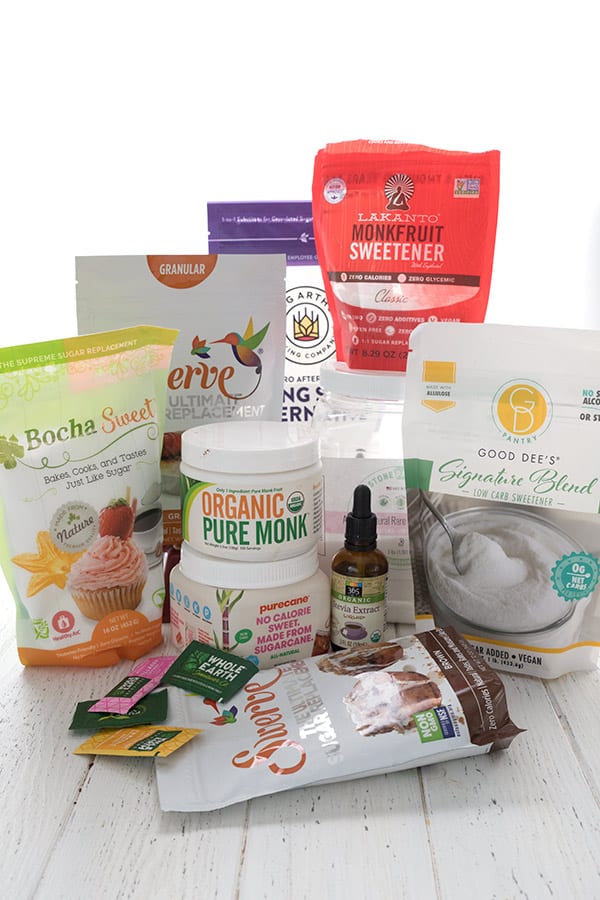
What is the best keto sweetener?
I’m sorry, I simply cannot answer that for you.
I’m not being willful or stubborn, or deliberately withholding information. It’s simply that there is no such thing. Yes, you read that right – there is no such thing as the best keto sweetener.
Here’s why: Everyone experiences these sugar substitutes differently. It’s almost as individual as the individual themselves.
- Some people experience an unpleasant aftertaste with one and not another.
- Some people suffer from GI issues or headaches when consuming certain sweeteners.
- Some people see a blood sugar rise when other people do not.
- Some people may even experience an allergic reaction to certain sweeteners.
With the sugar substitutes market constantly expanding and changing, it’s much more about finding what sweeteners work best FOR YOU.
What are the best sweeteners for keto baking?
Ah, now we’re on to something. This is my territory and one that I have researched extensively. I have experimented with a wide array of sugar substitutes and I can tell you straight up that none of them behaves exactly like sugar.
They all have very different properties and the sweetener(s) you choose will impact the outcome of your recipes. The trick is to understand their different attributes and use them to advantage.
Consider the final product before choosing your sugar substitutes. What are you trying to make? What consistency are you trying to achieve? Do you want it crisp or soft? Chewy or cakey? Should it be gooey or firm?
Most of the popular brands on the market are actually blends of two or more keto sweeteners. For simplicity’s sake, I am going to break them down into their main ingredients.
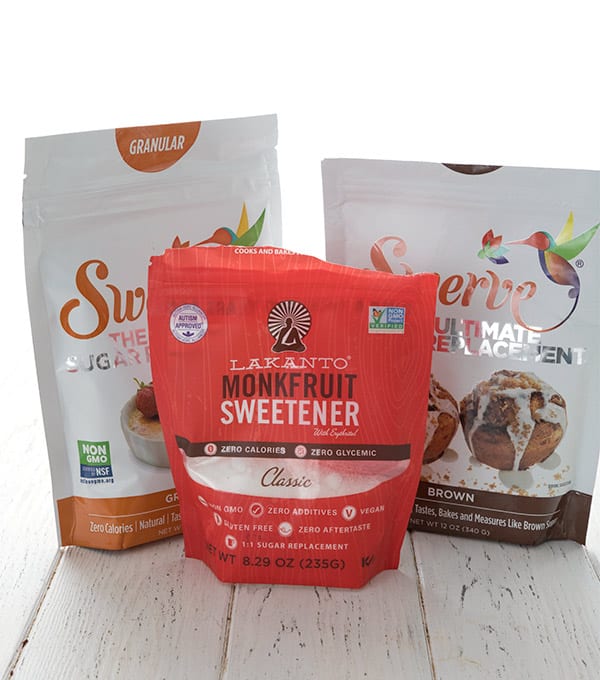
Erythritol
What is it?
Erythritol is a sugar alcohol (polyol) that is naturally present in some fruits and fermented foods. For mass production, it is made by fermenting a glucose syrup with enzymes.
It is unique among sugar alcohols in that it has zero carb impact. Our bodies simply do not recognize it as a carb so it does not impact blood sugar at all. And unlike many sugar alcohols, it does not cause gastrointestinal issues for most people.
How does it work?
Similar to sugar:
– Erythritol mimics sugar in its crystalline structure, so it helps whip air into butter and egg whites.
– It also browns and crisps up nicely and it can even be coaxed into caramelizing.
Differs from sugar:
– It’s only 70% as sweet as sugar, which is why most brands combine it with other sweeteners, to make it measure cup for cup.
– It’s non-hygroscopic, meaning that unlike sugar, it does not attract or hold onto moisture, which can cause baked goods to be dry and crumbly if they don’t have enough fat.
– It can re-crystallize as it cools, particularly in liquid applications like sauces, custards, and ice cream.
– Some people experience a mouth-cooling sensation, similar to sucking on a mint. Not everyone experiences this, and often mixing it with other sweeteners eliminates this sensation.
Major Brand Names: Swerve, Lakanto (this is mostly erythritol… do not be fooled by the fact that it calls itself a “monk fruit sweetener”), So Nourished, ZSweet.

Xylitol
What is it?
Xylitol is also a sugar alcohol found in some fruits and vegetables, as well as in wood and corn. It is usually manufactured commercially from corn or birch trees.
Some, but not all, xylitol is absorbed by the intestines into the bloodstream. This means it can cause some gastrointestinal discomfort when consumed in large amounts. It can also have an impact on blood sugar.
WARNING! The biggest issue with xylitol is that it is highly toxic to dogs.
How does it work?
Similar to sugar:
– It has a crystalline structure so it can whip air bubbles into butter and egg whites. It’s also as sweet as sugar.
– It’s more hygroscopic than erythritol so it attracts moisture and it doesn’t re-crystallize as it cools. Xylitol is great for ice creams and sauces to keep them soft.
Differs from sugar:
– Xylitol doesn’t caramelize or crisp up very well. This can cause problems for baked goods that need a crisp texture, like many keto cookies. They will turn out much more cakey and soft if you use xylitol.
– Definitely do NOT use for meringue, as it will stay gooey and soft, and won’t come off the parchment paper.
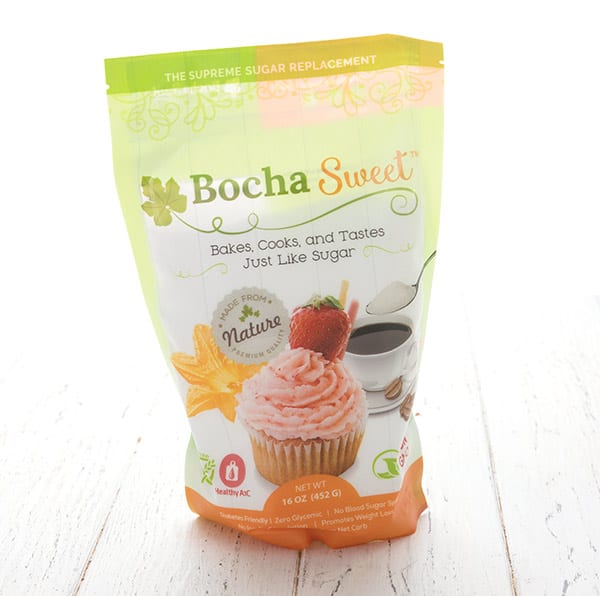
BochaSweet
What is it?
BochaSweet is the brand name of a unique sweetener derived from the kabocha squash, a type of winter squash also know as Japanese pumpkin.
Like erythritol, it seems to have little to no impact on most people’s blood sugar. But like xylitol, it can cause some gastrointestinal upset when consumed in large quantities.
In many ways, BochaSweet functions a lot like xylitol (they are both pentose sweeteners), but it does not appear to be toxic to household pets.
How does it work?
Similar to sugar:
– BochaSweet is as sweet as sugar and so can be used as a cup-for-cup replacement, without an apparent aftertaste.
– It is more hygroscopic and doesn’t re-crystallize so it’s great in sauces, custards, and ice creams. (I have started using it in combination with Swerve in all of my keto ice cream… they stay scoopable even straight from the freezer!).
Differs from sugar:
– Just like xylitol, BochaSweet will not crisp up or brown very well. Cookies end up soft and cakey, and meringues are so gooey that they won’t come off the paper.
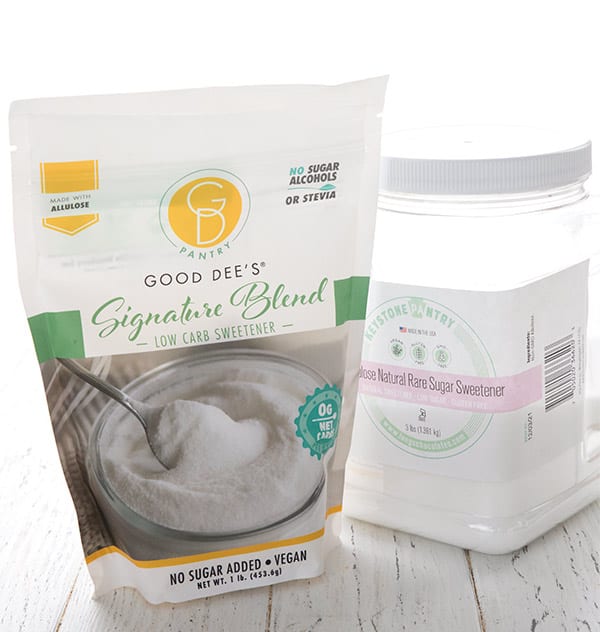
Allulose
What is it?
Allulose is a relative newcomer on the sugar alternative scene and has become incredibly popular. It is a monosaccharide, which means it really is a “sugar”, but one that our bodies don’t treat like a sugar or a carb. It is largely excreted without ever affecting blood glucose levels.
However, I caution you from personal experience that large amounts can cause serious GI distress. Many people don’t seem to suffer from this, but some of us do and it’s…not fun.
So it’s worth testing on yourself in small amounts and building up from there.
How does it work?
Similar to sugar:
– Allulose caramelizes nicely and tends to be hygroscopic, keeping sauces and ice creams soft, and baked goods tender.
Differs from sugar:
– Allulose is only 70% as sweet, which means you need more to sweeten your desserts.
– While it caramelizes well, it doesn’t crisp up well and baked goods tend to be soft and cakey. Even just a little allulose, in combination with other sweeteners, can prevent your cookies from becoming crisp.
– It can over-brown the outside of baked goods, especially the parts that are touching the sides of the pan. Cakes can have a dark, almost burnt appearance, although they aren’t over-cooked.
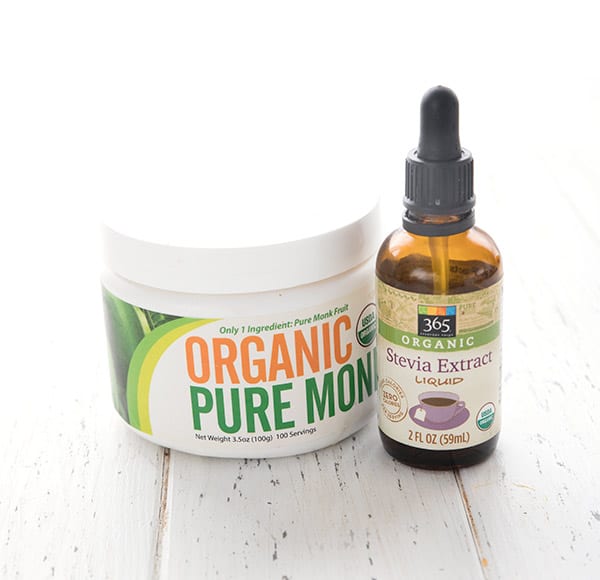
Stevia and Monk Fruit
I am lumping these two together because they have many similar properties and behave much the same way.
What are they?
Both stevia and monkfruit are naturally derived, plant-based sweeteners that are hundreds of times sweeter than sugar. Because they are extremely concentrated, a tiny amount can sweeten a whole recipe.
While that may sound like a good thing, it can have major implications for your keto baked goods. Read on…
How do they work?
Concentrated sweeteners like these have no “bulk” – they have little in the way of weight or volume so they don’t add much to your recipe other than sweetness. They can’t contribute anything to texture or consistency, and they don’t caramelize, crisp, or brown your baked goods.
Bulk is an important factor in anything from cupcakes to frosting. Substituting a non-bulk sweetener means your keto treats may not rise properly, may be more fragile, and may not set properly.
“Monk fruit sweetener”
Please be aware that many brands that bill themselves as “monk fruit sweetener” are actually mostly erythritol. The main ingredient is erythritol, with a little monk fruit to make it sweeter. This means that the sweetener will behave mostly like erythritol.

How to use sugar substitutes
I’ve thrown a ton of information at you and I know it’s hard to digest it all. I do this for a living and still I have times when a certain sweetener doesn’t behave the way I think it should. But here’s a quick cheat sheet on what to use when:
Want crisp keto cookies? Use erythritol based sweeteners like Swerve, Lakanto, or So Nourished. Other options will make your cookies soft and cakey. I highly recommend Swerve Brown for the best brown sugar substitute for cookies!
Making a keto cake recipe? Use any sweetener that has bulk (erythritol, BochaSweet, xylitol or allulose), but do be forewarned that some are not quite as sweet as sugar and you may need more of them.
Making a keto frosting? You need a bulk powdered sweetener to give your frosting structure. Erythritol, xylitol, and BochaSweet all have confectioners (powdered) versions. Allulose may as well but I am unsure of brands.
Want a gooey consistency? Try using BochaSweet or allulose, or combine it with another erythritol based sweetener. This combo is perfect for things like keto caramel sauce or my keto pecan pie.
Want keto ice cream that stays scoopable for days? My recommendation is half Swerve and half BochaSweet or allulose. Using only erythritol based sweeteners makes your ice cream rock hard, and all BochaSweet makes it too soft (it stays like soft serve!).
Just trying to sweeten your coffee? Use whatever you like best. They all work well if you don’t need a certain consistency so this is a matter of personal preference.
Still have questions?
Leave a comment and I will do my best to answer!
Adding to the confusion is that many brands on the market are blends of the keto sweeteners I outlined above. Blending sugar substitutes can maximize their sweetness and reduce potential aftertastes.
But I’ve tried such a wide array of sweeteners, I have a good idea of how most of them work. I can also take an educated guess based on the ingredients list. So drop me a line and I will give you all the information I can.

Free Bonus: Secrets to Keto Baking!
Sign up for your favorite recipes delivered straight to your inbox plus get our FREE bonus: Secrets to Keto Baking!

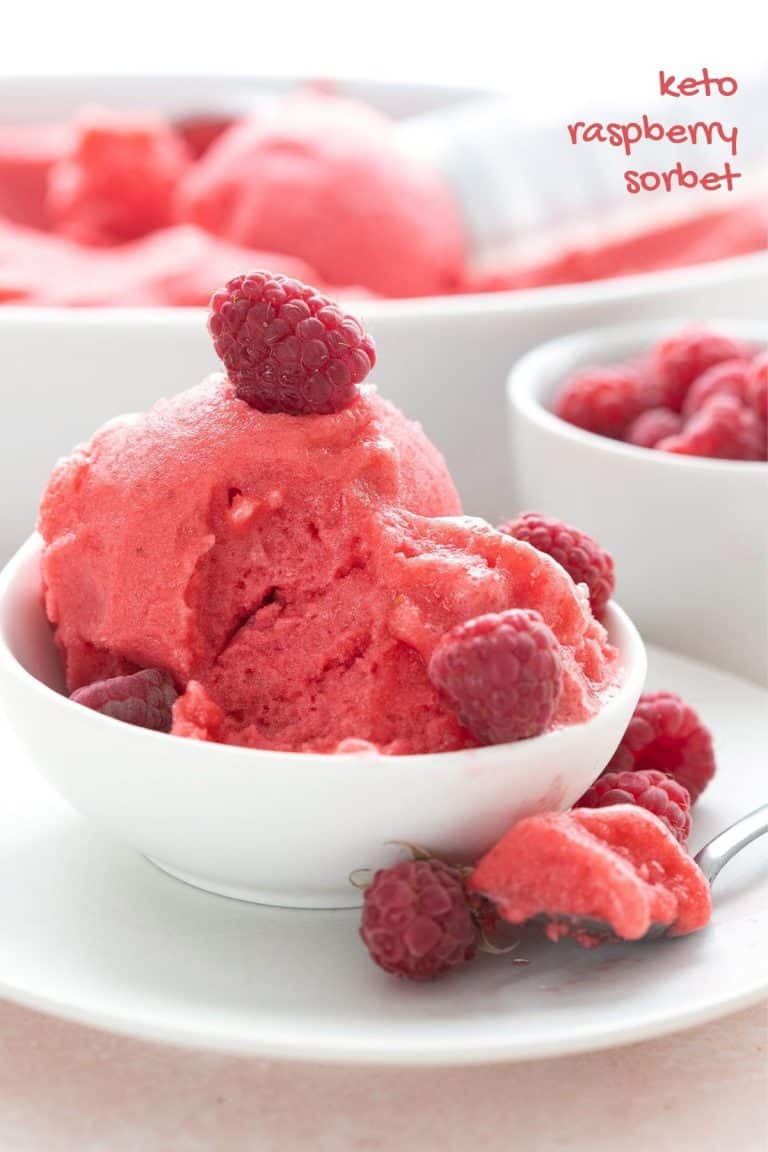

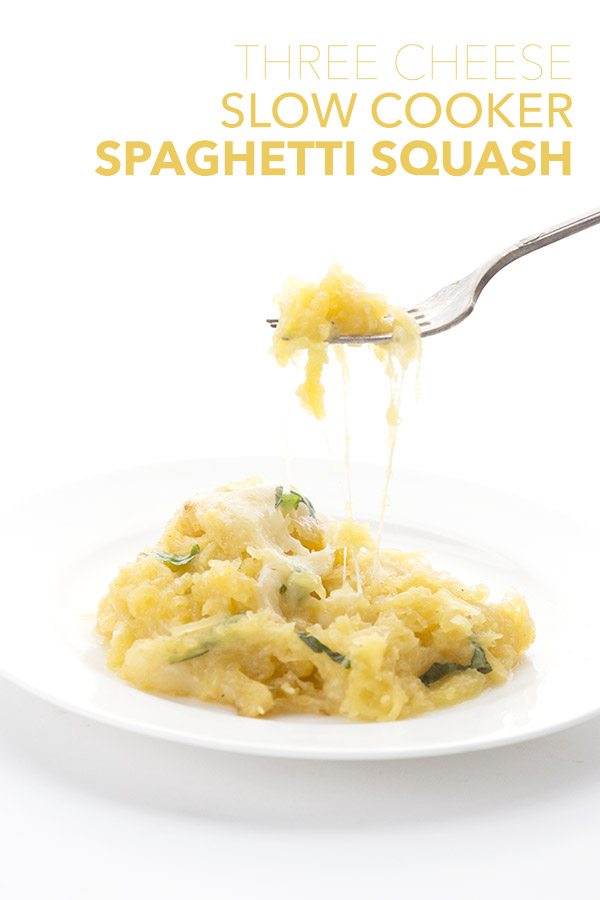

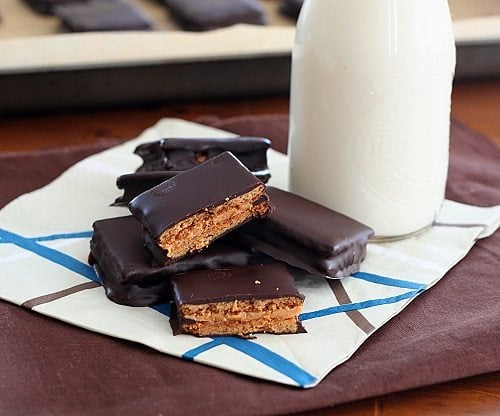









Thank you for this treasure trove of information! Very helpful! I love all your recipes!
Thank you for all you create!
Hi carolyn, I love your site and your recipes. Is there anything wrong with using Splenda?
I personally prefer naturally derived sweeteners. Also, Splenda does not really bake that well in many recipes.
I am new to Allulose and do not know if I should buy granulated or powdered Allulose……or both? How would I know which to use?
I LOVE, LOVE, LOVE your recipes and also your recipe books!!!! Never stop or where would I go for a wonderful keto recipe?????
You can just purchase granular, it works in most recipes.
Hi Carolyn! I am also someone who loves to bake and I would love to adapt my macaron recipe to low carb. The buttercream fillings would be an easy conversion and it seems that the shells also should be an easy swap but, if you have ever made them, you know that those little cookies are fussy! I read the sweetener article and it seems to me that erythritol will be my best bet to try and get a sweetener that will whip up and then act right in the oven. Does this seem reasonable to you? I also have a question as to why you use confectioner’s and granulated Swerve in your meringue recipes. I didn’t see an explanation for using both. Please forgive me if I overlooked the obvious. I know you must get tired of answering the same questions over and over. Anyway, the ingredients are so expensive – even the eggs these days – so I was hoping to get your opinion before I launch in to give me the best chance of success. Whatcha think?
I have never quite had much luck with macarons.
Hi, Carolyn. I used to use Swerve exclusively. Now that they’ve changed their formula, I have to switch because Allulose upsets my stomach. Have you found another brown sweetener that tastes like brown sugar?
Don’t panic, you can still use Swerve! Just choose the “monk fruit” version of their sweeteners.
Granular: https://amzn.to/40Gvi1q
Powdered: https://amzn.to/41RZYNX
Hi, Carolyn. I have a dear friend who so far, can only tolerate monk fruit (entirely) as a sweetener. She has elevated A1Cs and is trying to get them lower. She is not a baker, but I am. Complicating the matter, is her very sensitive GI tract. If I were to use one of your recipes using entirely monkfruit, which recipe(s) do you recommend and how much monkfruit in those recipes do you suggest? I have 4 of your cookbooks: the “everyday keto,” “breakfast,” “baking,” and “dinner..” I’ve read your article on artificial sweeteners for keto, but am still concerned about baking something from your cookbooks without causing a “blowout” in my friend. Thanks.
So you mean pure monk fruit extract? If that’s the case, stick with things like muffins or cakes (without frosting). Those are the kinds of baked goods that work best with pure monk fruit or pure stevia extracts. Neither of those sweeteners have any bulk so you need a baked good that doesn’t rely on the sweetener for consistency.
Would allulose work in your marshmallow recipe in place of Bocha sweet?
No, sadly… it makes them SOOOOO soft and they melt too much in other recipes.
This is an amazing resource, thank you! Do you have any experience with how pure monkfruit sweetner in liquid form (so no erythritol) behaves in ice cream or other frozen / cold temp applications? I am quickly and sadly finding out that all of the other sweeteners give me major gut issues, so this is kind of my last hope.
Pure monk fruit will sweeten your ice cream sufficiently… but the ice cream will freeze rock solid. It takes sugar or allulose or BochaSweet to give ice cream a soft consistency.
I have recently developed the gastro intestinal issues with my home baked goods. I have solely been using Swerve for my baking needs. Am I correct that all keto friendly sweeteners can cause issues?
All sweeteners CAN cause issues, but not all do. Some do for some individuals and not for others. It’s a crapshoot!
Haha Crapshoot….too funny! For many of us it sends us right to the crapper, that’s for sure.
Do you have a printable guide to sweeteners?
In my book, The Ultimate Guide to Keto Baking! 🙂
Thank you. After borrowing the book from the library, I am going to order it. Thank you, the book has great information.
I’ve been so happy with erythritol for years–no xylitol fear of the dogs getting poisoned; no funky GI side effects; reasonably close in taste so my sugar-loving friends don’t notice. But now all the stroke and cardiac concerns mean I’m back to square 1 (see this NIH review for details: https://www.nih.gov/news-events/nih-research-matters/erythritol-cardiovascular-events ).
So we’re switching to allulose, which does take some getting used to. Thanks for clarifying why my almond-based cakes are browning too quickly at the edges.
I recommend reading much more on this study and the many responses from credible sources that indicate the flaws and gaps in it. Because that study was extremely preliminary and while cutting back on erythritol is probably a good idea, it’s not as panic inducing as the media made it sound.
I am really starting to not like the cooling effect of powdered Swerve. What would be your suggested alternative for frostings, glazes, etc? And would I use it 1:1 ratio if a recipe calls for Swerve powdered?
You could try powdered BochaSweet, which also measure like Swerve. I do find that frostings sometimes split with it and it really clumps badly in the bag! https://amzn.to/400Zhl1
I simply can not tolerate erythritol, it makes my mouth feel terrible in any amount. Is there any other option? I have tried all the blends and none work for me
if they contain erythritol. I love your recipes, have your cook books and appreciate all your hard work!! Especially you videos!! I wish there was a video for your strawberry scones. Would allulose and monk fruit sweetener (like Besti) white, work in the scones and Besti brown in the cookies. I am desperate to make “Cowboy Cookies” like those at Longbottoms Coffee in Portland OR, for my grandson who is a diabetic. I was hoping I could just add shredded coconut to your chocolate chip cookie dough. But my daughter won’t use erythritol for the same reason I can’t.
Thanks, a really good report and I’ve not seen anything like it to really show what it does to different types of baking. BUT I do know that Erythritol is a HUGE no no for me, creates horrible digestive issues, and seems to be in almost all of the sweetners! My GI doc said “stay away from the sugar alcohols”….it’s a challenge. I do like Stevia and Monkfruit (if without the artificial stuff) and have just started on Allulose without too much issue. ALL of the sub sweetners are horribly expensive, so I rarely bake now.
I am unable to get liquid Allulose but I can get granulated. I would like to make my own liquid Allulose if you have any tips for this I would be grateful.
I am sorry, I don’t!
How do you store your sweeteners, especially Swerve Granulated and powdered?
I have airtight metal canisters, the sort of thing you would keep flour and sugar in! 🙂
Caroline,
I am so bummed about the latest news about erythritol from CNN health.
From here on out it is just Bocha Sweet and Allulose for me.
Dear Carolyn,
My son just sent this to me; I want to sent link to you.
https://www.cnn.com/2023/02/27
/health/zero-calorie-sweetener-heart
-attack-stroke-wellness/index.html
This is about erythritol. Let me know what you think.
Valerie
Yes, we’ve been discussing it on my Facebook page.
My take is that while concerning, it’s not time to panic. It’s a single study, and even by the authors’ own admission, it’s not conclusive. It warrants much more research. Keep in mind that news outlets love to sensationalize these things and make it sound cut and dried, when it’s not.
They studied people already at risk, and their follow up sample size was 8 people. They also gave those people 30g of erythritol to consume, which is a lot for anyone to consume in one sitting!
However, it’s definitely something to watch and to consider. Will I stop using Swerve? No. Will I be more mindful of how much I am using? Yes.
I am also going to give as many sweetener options as possible in my recipes from here on in. I have too many in my archives to go back and do it for every recipe but I will do it as it comes up…
I noticed I don’t see any recipes involving the sweetener, PureCane, (PureCane.com), even though it comes in white, brown, and confectionery versions and is zero carbs & keto friendly. I’ve used it and really like it! The maker says it is 1:1 ratio to sugar but I use even less as it is very sweet. Considering the most recent controversy on erythritol I wonder if you think it might be a great keto sweetener alternative to erythritol. I would love to see you try PureCane in your recipes and hear what you thought about it and how it behaved in your baking/ how recipes turned out.
Sorry to be the bearer of bad news but PureCane IS erythritol. Please look at the back of your bag. The ingredient list is as follows:
Erythritol, soluble fiber, sugarcane reb M.
Very interesting. Which sweetener is best for meringues cookies or macarons?
Swerve.
Carolyn, thank you so much for all your great recipes! I have a question about Swerve Brown: how do you measure it? I’ve been making the candied pecans and it seems like there’s too much swerve. Do you pack it into the measuring cup or do you weigh it? If you weigh it, is it 4 ounces for half a cup? Thank you!
“Lightly pack”… don’t cram it in there, but it basically packs itself lightly anyway as you scoop.